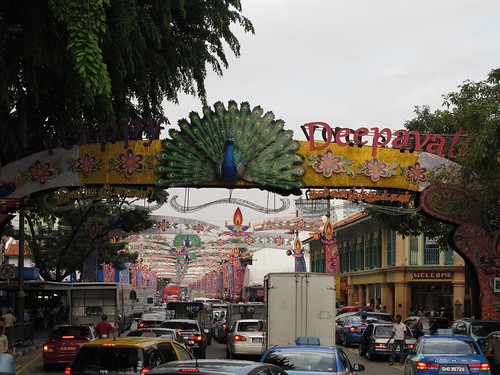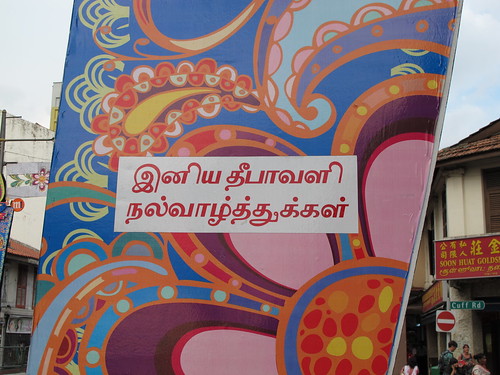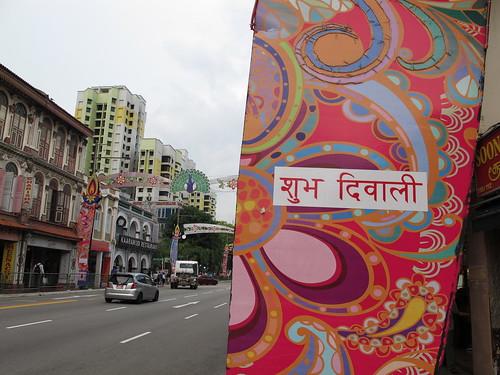In my previous post, I looked at what the government had hoped to accomplish through its language policies, as summarised here in this quote from Lee Kuan Yew:
"Our ideal was that the Chinese would be able to speak English and Mandarin, Malays would be able to speak Malay and English, and Indians would be able to speak Tamil and English. Alas, the situation did not develop as we had hoped."
In this post, I consider the seeming perpetual need for English and Mandarin campaigns in Singapore. After all, English was meant to be the language of wider communication, and the 'mother tongues' were to be the language of each respective race. But even after decades of policy that has institutionalised and privileged languages like English and Mandarin (and involved the vilification of Chinese dialects), why do we still need the
Speak Good English Movement (SGEM) and the
Speak Mandarin Campaign (SMC)?
[Note that despite falling use across
all three 'mother tongues' in households, the decline of Malay and Tamil has never warranted similar campaigns for these languages.]
Singlish and Singdarin
The villains in this story are typically Singlish and Singdarin (sadly not an Elvish language). The local variety of English
Singlish (colloquial Singaporean English) is often viewed as 'broken English', as opposed to correct 'Standard English' and has been described by the government as a 'handicap' which prevents one from accessing better job and educational opportunities (Wee 2010). Similarly, a local variety of Singapore Mandarin also called
Singdarin, viewed as 'broken Chinese' has also emerged. This has become another cause of concern, especially if 'Mandarin' speakers from Singapore find it difficult to understand and to make themselves understood by Mandarin speakers in China and Taiwan.
The continuing existence of these varieties seems to be why we perpetually need to have such language campaigns. But why do these 'substandard' varieties still persist? After all, they're not exactly prestige forms and even speakers of Singlish sometimes describe it as sounding 'uneducated' and 'immature'. Some speakers, who are able to codeswitch between the colloquial variety and the variety closer to what is understood as 'standard English', cringe at the use of Singlish by other Singaporeans, especially in the presence of non-Singaporeans.
One common answer I get to this question is that in most schools, English teachers and Chinese (Mandarin) teachers themselves cannot speak 'good English' and 'good Mandarin'. Therefore, the students learn 'bad English' or 'bad Mandarin' and continue the cycle when they leave school. The media has also been blamed in the past - hence
the banning of Singlish on TV shows like Phua Chu Kang back in 1999.
This is still a rather simplistic answer to the question. Language is used in numerous domains outside the classroom and the media. The use of Singlish and Singdarin in schools (and previously in the media) is not enough reason to explain their persistance. The prescribed solution is equally simplistic. Modelling 'proper English' and 'proper Mandarin' for speakers to follow in schools and in the media, does not immediately, or eventually, result in the faithful reproduction of these models of 'good English' and 'good Mandarin'.
Instead, we need to re-examine the associations made between language and identity, and move beyond the official racial categories and the 'mother tongues' that have been assigned to them. We need to start considering what goes on in day-to-day interactions among speakers of Singlish and Singdarin.
Language in the moment
When talking about language and identity, much attention is paid to the correlation between
what language you speak and your identity (defined in racial terms here). In contrast, little attention is paid to
how speakers actually use the languages they know, and in what context they use these languages.
I am reminded of John Gumperz, a famous sociolinguist who passed away week ago, and his work on conversation analysis and interactional sociolinguistics. [
You can read the story of how he helped identify a source of intercultural miscommunication at Heathrow Airport in the 1970s in the article.] He was interested, amongst other things, in how people make conversation. This sounds simple enough, but to maintain a conversation, speakers have to process a huge amount of verbal information (e.g. choice of words and topics) and non-verbal information (e.g. intonation, gesture, clothing & appearance) within a particular context (e.g. at the workplace between an employer and an employee). The actual processing is mostly unconsciously done, but being able to read these cues has consequences for how we speak, what we can talk about, and what attitudes we think we can share regarding these topics.
Most people are aware that the way we speak to our boss is usually different from the way we speak to our friends (and even if our boss was our friend, there may be differences when we are speaking in the workplace and when we are outside). However, what they may not realise is that they are always doing this, even when speaking with friends, or when buying food at a hawker centre.
Taking a simplified example, I've noticed that my Singapore English-speaking friends and I will avoid using sentence-final particles like
lah when speaking with non-Singaporean English speakers. However, these particles may appear again when speaking in the presence of Singaporean English speakers. On one level you might say, "It's because others don't understand '
lah'." But it's more than just that. In a sense, what we're doing is monitoring our own speech to ensure that we are recognised as competent English speakers in the first situation, since
lah is associated with 'broken English'. In the latter, we're subtly asserting our identity as a Singaporean and that we share some cultural knowledge that others may not be aware of.
Why u so liddat ah?
Some people might ask: But why do we do this? Shouldn't we be free to say whatever we want and however we want to, especially when we are in less formal situations?
A few days ago, I went to Toast Box in Clementi for lunch. I ordered
nasi lemak. The person at the counter told me that they'd run out of
ikan bilis. I took an extra second to look at the menu to see if there was anything else that could satisfy me more than an
ikan bilis-less
nasi lemak. In those few seconds (milliseconds even), the person at the counter interpreted my hesitation as confusion, and proceeded to explain to me what
ikan bilis was: "the small fish".
For me, something had gone wrong in this communicative exchange, minor as it was. Having grown up in Singapore, of course I knew that
ikan bilis refers to the crispy anchovies (which really should accompany any decent
nasi lemak)! However, some element of the interaction, whether it was my appearance or my accent or my choice of language (although, all I said was, 'One
nasi lemak'), signalled to her that I may not have been Singaporean. Consequently, rather than interpreting my hesitation as 'considering my choices', she thought it was because I didn't understand what '
ikan bilis' meant. From her perspective, she was just trying to be helpful, but from my perspective, it was actually a little annoying that she didn't recognise that I was Singaporean, and that she had to explain to me something that I understood as basic local knowledge.
This is one reason why we might modify our language behaviour and more generally, present ourselves in a certain way (which I clearly failed to do in the above situation) - we are trying to make it known to the people we are talking to that we have shared knowledge and experience. At the same time, we are also using cues from other people in the conversation to work out if we do share any of this cultural knowledge and experience. Ultimately, this has consequences for what we talk about and how we talk about these topics (e.g. what attitudes we can share) within that particular conversation.
Damn atas, he
As much as language is used to mark membership of a group, it can also be used as a basis for exclusion. Taken to its extreme, people can use language to isolate and ostracise others who do not belong to the community - at the national level, we have the infamous
diction test from the White Australia policy era, but all societies have had their own
shibboleths to mark who belongs in a group, and who doesn't. It does seem that at least a small degree of exclusion is necessary to maintain an individual and a group's sense of identity (through a process of '
Othering' others.)
It is not just a case of people with higher status excluding people who are perceived to be of lower status. The opposite can happen too. For example, if an Australian went to the UK and came back speaking with any sort of British accent, they would probably be ostracised and called a 'twat'. Similarly, if a Singaporean started speaking with a foreign accent in most informal situations here, people would say they 'talk like
ang moh'. There are a myriad of reasons for the adoption of the other accent, especially if the person grew up in that country. When the other language variety carries more status or power, people back in the home country may read the linguistic cues as a projection of dominance by the returning person - 'They think they're better than us!' In some cases, they would be right, but even in others, social exclusion is still inflicted on the 'offending' person where no offence was intended.
I've also encountered this myself - once I was criticised by a friend and a waiter for sounding
atas, a term used to describe something or someone as being 'high class' (from Malay, meaning 'above'), but with a slightly pejorative sense. All I was doing was speaking what I considered to be 'standard' Singapore English, as opposed to the more colloquial form of Singlish. In a sense, I was being 'punished' for not conforming to the expected social norms of that situation.
But as frustrating and painful as it is for individuals to be marginalised like this, we also need to remember that the very groups responsibility for this marginalisation -usually speakers of the basilectal / most colloquial varieties of Singlish and Singdarin who are generally unable to codeswitch to more standard varieties- are also among the most marginalised within Singapore society (typically an English-speaking elite and middle class). It is easy for a speaker of a dominant language variety to ignore the sociolinguistic realities of other people in society and think, "I speak [language / language variety], why can't they too?" or to assume that people of lower status will always want to emulate the speech of people with higher status.
That speakers of non-standard varieties of English and Mandarin continue to use and enforce the use of these varieties, can be seen as the result of their own social exclusion from the rest of society.
The solution therefore cannot be for the government to simply tell people to accept the standard form and to stop speaking the way they currently do.
Furthermore, I suggest that Singdarin actually serves an important function of helping to distinguish Chinese Singaporeans from more recent migrants from the Peoples' Republic of China, given the very different histories of the two countries. For instance, Mao and the PLA mean very little to people here, and there's still a great deal more trust among people here since we never went through the Cultural Revolution. The current Speak Mandarin Campaign slogan
"Mandarin - It Gets Better With Use" seems almost absurd when we consider the contexts where Singdarin is currently used and why it is used. However, I acknowledge that more research is needed in this area before any conclusive arguments can be made.
Switching back and forth
If we recall, use of these varieties form the basis for
social identification through their use in everyday interaction, which would be lost if people were made to speak like people from China, or to emulate 'proper' English speaking habits derived from British English. (In fact the problematic nature of what is 'standard Singapore English' and 'Standard Mandarin' will have to be discussed in another post.) The effect of forcing most Singaporeans to use standard Singapore English or standard Mandarin, which are associated with more formal situations, in
all day-to-day interactions would be akin to making the participants at a birthday party sound like they were at a business meeting full of strangers. What would work better is if speakers were able to switch between the colloquial and the standard.
I should state that I'm not actively advocating the use or development of Singlish or Singdarin. What I am advocating is that we acknowledge their existence and the important role they play in personal and social identification in this country, which will explain their continued existence despite the government's efforts. At the moment, there is little motivation for Singdarin speakers who only live in Singapore to give up Singdarin and only speak 'standard' Mandarin, especially if it means that they will end up being identified as Mainlanders themselves. There is also little motivation for individual Singlish speakers to completely abandon Singlish in favour of standard Singapore English in their day-to-day interactions with other Singlish speakers, since they would risk being labelled
atas or worse, like they
talk like ang moh.
Ideally, these speakers would be able to codeswitch between Singlish and standard English, or Singdarin and standard Mandarin, depending on the situation. The problem here is that many speakers can't switch between the two varieties (not that they need to in many day-to-day situations) and it is unrealistic to eliminate the colloquial varieties, since others will pop up to fulfill the sociolinguistic functions mentioned above. Consequently, we will end up in an never-ending cycle of campaigns encouraging 'better' language use.
The current language policy favours a one-variety-or-nothing rule (for both English and Mandarin) and ignores any of the sociolinguistic functions of these language varieties. My own feeling is that rising xenophobia in this country can be partly attributed to the fact that a good portion of the population is constantly told both by the government (and by new arrivals) that they are not good enough, that their language skills are not good enough, and that they should learn to be and speak more like foreigners - and to essentially, give up their old identities. And yes, at the moment, many people have language skills that are not good enough if they want to work in areas like the banking sector, but how do we get to a point where most speakers of these varieties and their children are able to effectively switch between varieties for use in different situations?
I hope that from what I've discussed, it has become to some readers that a good first step is to
acknowledge the need and the value of these local varieties in providing social cohesion, instead of trying to eliminate them completely. They do not need to become enshrined as official languages, but the people behind language policy and language teachers need to know they have more value than people realise. For instance, at the classroom level, teachers could be trained to help students codeswitch between the two varieties. In this way, students can maintain a sense of identity (and self esteem), while picking up the language skills that the government so desperately wants its citizens to have to participate in its workforce.
Finally, although I've been speaking about Singlish and Singdarin as being distinct varieties from their respective standards, it might actually be more useful to think of them as being on a continuum. Even speakers of the 'standard' varieties will find themselves on different parts of the continuum in their interactions with other Singaporeans. I would argue that for many of these speakers, it is their ability to place themselves on this continuum depending on the situation that actually forms the basis of identity for them, much more so than any official 'mother tongue' they are supposed to speak.
Of course, if the government and the educated public still find these language varieties so vile and broken, maybe we should try and bring back Chinese dialects and encourage speakers to codeswitch between them and standard Mandarin.








